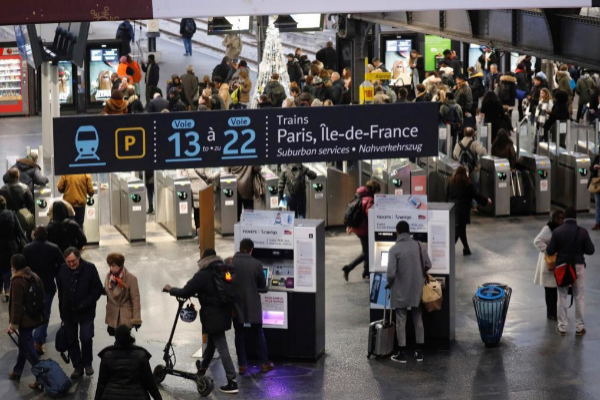- France.Macron plays his mandate in the mother of all reforms, retirement
- Labor: From 42 special regimes to one: this is the pension reform of Macron
France is going to live a black Thursday . A massive public transport strike called by the unions against the plans of the president, Emmanuel Macron , to reform the retirement. Unemployment can last several more days.
Why do they strike?
For the retirement reform. The government has not made public the bill that it intends to take to Parliament. There is still a round of contacts with all unions and employers. After her, the prime minister will reveal the reform. But what he does know is that the Government wants a universal system, by distribution and by points. The Executive is determined to end the 42 special retirement regimes. Among them the railroad and public transport workers in Paris. In a brushstroke, they retire earlier and charge more.
Who goes on strike?
The SNCF (the French Renfe) has canceled 90% of its high-speed trains and 80% of the regional trains. Half of the Eurostar will circulate to London and only one train to Spain. In the Outskirts of Paris there will only be trains at peak times. And few. In the Paris Metro, 11 closed lines, two with a train and two normally because they are automatic. 25% of buses. The strike will be seconded by a controllers union, so Air France cancels 30% of its internal flights and 15% of the medium-haul flights. easyJet has canceled 233 of its flights. More than half of the teachers have joined the strike as well as 60% of high school teachers. The strike will significantly affect the gas and electricity companies where 140,000 people work. Minor stoppages are expected in Renault and PSA and in hospitals.
Who supports her?
Only the most moderate of the unions, CFDT, (and the most voted in the last union elections) has not joined the strike but its railroad section does. The rest, with the CGT in front, have been preparing the movement for months.
The left (PS and PC), the extreme left (Insumisos) and the extreme right (RN) are in favor; the Greens, with nuances; the right will denounce the "blockades" but does not support the reform of Macron that will succeed with the votes of his party, majority in the Assembly.
How long is it going to last?
Most strike calls are "unlimited" or "renewable." So the strike will extend for several days although nobody says how long. The SNCF does not sell tickets for any train until Monday. The first day of next week will be key to knowing how long it can last. Although the 1995 precedent is evoked (three weeks in a row without transport), the unions seem to favor a "short but intense" movement.
Are the unions strong?
All attempts at interprofessional stoppages by the CGT have failed since 2016. Since the great strike of 95, the unions have failed to make any government recular. Extending the strike to the private sector is unimaginable. The concept of a general strike is foreign to the French union culture and associated with the anarchism of the 19th century. Not even in May of 68 there was a call for a general strike.
The union leaders have the moral food for their recent failures and for the signals they receive from society. Even in the SNCF and Parisian transport, participation in the last union elections dropped almost 20 points. Only 62% of employees say they trust the unions according to an Ipsos survey last July.
The union leaders feel the pressure of their bases, which set an example of the struggle of the yellow vests a year ago that made the Government withdraw its rate on diesel and a million in social measures.
And the 'yellow vests'?
They support and will manifest. In the case of an assembly movement, made up of precarious and unorganized workers, they will be noticed especially in the street. This scares the government and the unions themselves. The executive assigned 6,000 police officers to the main demonstration in Paris. The unions have reinforced their own order system. The prefect has ordered the closure of all shops and the withdrawal of candles and terraces from the cafés along the route of the demonstration. It is forbidden to manifest in the Champs Elysees and the sensitive area that goes from the Elysium to the Assembly; Since, according to Interior, there are 245 demonstrations convened, it will be rare that the thing does not overflow somewhere. The Government is very concerned about the day on Saturday where the yellow vests will manifest.
Minimum services?
There is not. The 2004 Constitutional Council ruled that "guaranteeing a normal service by time zones" would be "disproportionate interference in the right to strike." Sarkozy promised to guarantee by law six hours of public transport at peak times, but he did not. Its 2007 law imposes sanctions on workers who do not notify their employer that they are going to strike 48 hours in advance, so the percentages of strikers can be anticipated. Any form of payment for strike days was also prohibited.
According to the criteria of The Trust Project
Know more- Paris
- France
- Renfe
- London
- Spain
- Emmanuel Macron
Infrastructures The end of the Renfe monopoly forces the price drop of the AVE in 60% of the network
Events CDRs call "total blockade" at Barcelona train stations
MobilityOther green cars: there is life beyond electric cars

